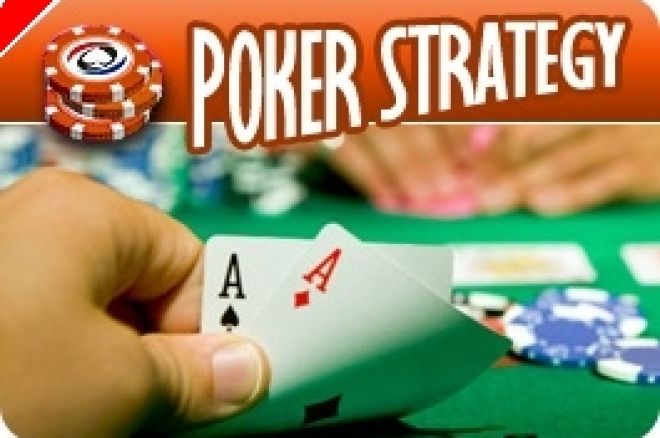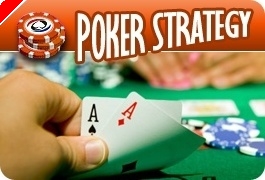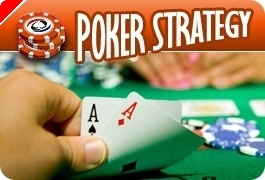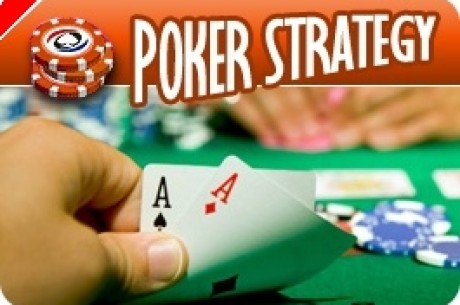Stud Poker Strategy: Take a Card Off? — Part 2 of 2

In my last column we looked at an extreme case when it made sense to "take one off." Here we'll look at the other extreme and then look at some guiding questions to help you figure out what to do in less extreme cases.
Jane sits down in a $10/20 game with a $1 ante and a $2 forced bet. She's watched ten hands or so. She's raised twice with the high card and won uncontested each time, with everyone else folding on third street. All of the other hands were either uncontested or heads-up until the river. Her opponents are tight and aggressive.
She's dealt the following hand:
(3♠ 3♣) 5♦
When she looks around the table clockwise, she sees the following:
6♦
A♥
J♠
3♦
7♦
8♣
8♦
The three brings it in, the seven and the two eights fold. Jane must act before seeing the action of the other cards. Should she "take one off?"
While a wired low pair is not an automatic fold on third street, let's look at the specifics in this instance.
First of all, she's in what appears to be a tight game. The structure lends itself to this as well, with only a $2 forced bet instead of the more typical $3 forced bet in a $10/20 game. All of the hands she's played have either been folded on third or heads up. Pots are likely to be small relative to the initial bet – meaning poor implied odds. Also, since two remaining cards are high cards, one of them may well raise – either as a value bet if they have a pair, or as a steal attempt – since the other players tend to be very tight. She will then be facing not just the bring-in bet.
Her hand, a pair of threes, may well be the best hand right now, but because of the strong possibility of a steal attempt, she will probably not be able to see the next card cheaply. And Jane will be in the difficult position of not really knowing where she is at, since a bluff seems so possible. She has the possibility to improve, and if she improves by hitting a three she'll surely have her strength disguised and will get action, but one of the two remaining threes is already gone, leaving her seeking a one-outer. The other three cards that help her, the three fives, will only improve her to a small two pair, which may well end up as second or even third best if the ace or the jack stays in. And if she's not against aces or jacks up, she's unlikely to get action if she hits one of those fives since by pairing her door card, her opponents may well give her credit for trips. So if she does hit it and is in the lead she's unlikely to make much money from it.
Summarizing these important pieces of information, we see the following – and can decide whether Jane should be more or less likely to "take one off":
Tight Game Less Likely
Few cards improve her hand Less Likely
Cards she needs are partially dead Less Likely
Few players will be in for fourth Less Likely
Small implied odds Less Likely
Will probably have to call a raise Less Likely
Hand has some disguised value More Likely
Opponent's hands difficult to read Less Likely
I hope you reached the obvious conclusion that she should not take one off in this situation.
These two hands (see my preceding column for the other example) are clearly very different. But when we boil down them down to the essential ingredients necessary for deciding whether it is more or less likely to take one off, we are left with much the same criteria. Here are the questions you should ask when evaluating whether to take one off:
How many players are likely to be in the hand now and throughout the hand?
The more players, the more action, and the bigger the eventual size of the hand I'm likely to win, if I win.
How many cards are there remaining unseen that are likely to improve my hand on the next card?
The more cards that improve me, the more likely I am to take a card off.
If my hand improves, how likely is it to improve to the best hand – as opposed to just a better hand that might be second best?
The more likely my hand will be to win if it hits, the more likely I am to stay.
If I hit will I get action?
The more likely I am to get action when I hit, the more likely I am to take a card off.
Will I have control over my likely opponent as the hand progresses?
Some hands (and some opponents) are easier to read than others. As the hands develop, I am better able to know where I stand and whether I should fold, call, or raise. I am more likely to take one off if I think that I have a good read and will know where I stand as the hand develops.
In closing, each situation needs to be evaluated based on the specific factors in that hand. No two situations are exactly alike. But by having a frame of reference, you should be able to at least decide whether you should be more or less inclined to take one off in the future. If you have a particular question about a particular hand situation, please let me know. I'd enjoy analyzing it for an upcoming column.








